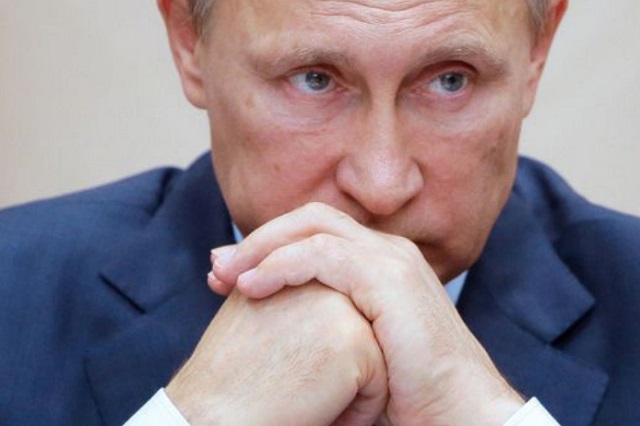
The sanctions imposed so far on Russia do not yet threaten the survival of the Russian state. But President Vladimir Putin may regard a Western attempt to cut off the remainder of Russia’s international trade, especially in energy, as an existential threat.
COMMENT | ROBERT SKIDELSKY | The West has imposed massive financial and economic sanctions on Russia in response to its invasion of Ukraine. But are the sanctions supposed to be a way to end the war? Are they a means of punishing Russia for its bad behavior? Or are they simply an expression of moral outrage?
This is the second time in less than a decade that Russia has been sanctioned for violating international law. Following Russia’s 2014 annexation of Crimea and incursion into eastern Ukraine, the United States imposed economic sanctions aimed at “effectively making it a pariah state.” Clearly, this did not have the desired effect of changing the Kremlin’s behavior. Now a new barrage of measures in response to the assault on Ukraine has ramped up sanctions to an unprecedented extent.
The current restrictions on Russia include a ban on trade in critical technologies, extensive asset freezes and travel bans, the denial of major Russian banks’ access to international capital markets, travel bans and asset freezes targeting individuals, and the exclusion of Russian aircraft from international airspace. With the sequestration of the Russian central bank’s foreign-exchange reserves and the promised eviction of Russia from the world financial and trading system, oil and gas will remain the country’s lifeline to the global economy.
All of this might seem a necessary moral response to Russia’s lawlessness. But when relatively light-touch sanctions give way to heavy economic bombardment, two key questions should be asked. First, at what point do sanctions become a pathway to war rather than an alternative to it? Second, what are such measures expected to achieve, and how effective are they likely to be? So far, these questions have scarcely been asked, much less answered.
Governments should consider the first question carefully before imposing sanctions on a great power, particularly one with nuclear weapons. If that power perceives a threat to its means of survival, there is a strong chance that it will fight to overcome the restrictions.
For example, when the US imposed an embargo on oil and gas exports to Japan in August 1941, following Japan’s seizure of oilfields in Indochina, the Japanese responded by attacking Pearl Harbor. And after OPEC subjected the US to an oil embargo in 1973 in retaliation for American military assistance to Israel during the Yom Kippur War, President Richard Nixon’s administration threatened to invade and occupy OPEC member states’ oil fields. The embargo ended.
The sanctions imposed so far on Russia do not yet threaten the survival of the Russian state. But President Vladimir Putin may regard a Western attempt to cut off the remainder of Russia’s international trade, especially in energy, as an existential threat.
As for the second question, the objective of economic sanctions is reasonably clear: to prevent or stop war by imposing unacceptable costs on the aggressor state. But while there is no doubt that the Western sanctions on Russia have greatly raised the costs to ordinary Russians of Putin’s war, no one expects that this will end the conflict.
The West instead hopes that the costs of the sanctions to Russia’s elite will achieve this result. Rather than lose their wealth, the argument goes, the elites may overthrow Putin or force him to end the war. This is the only rationale for the current sanctions that makes sense.
But the likelihood of Putin’s ouster, or even of a drastic change in Russian policy, is much lower than most people suppose. Essentially, it depends on Russia’s defeat in Ukraine, a prolongation of the conflict without any resolution, or a growing perception among Russia’s military that Putin has failed them. Far more likely is a ceasefire and at least the appearance of a Russian victory. In that case, economic sanctions will have done nothing either to stop the war or secure the peace.
A 2007 UK House of Lords report concluded that, “economic sanctions used in isolation from other policy instruments are extremely unlikely to force a target to make major policy changes.” Even sanctions’ rare success in forcing South Africa to abandon apartheid depended on two special circumstances, neither of which applies to Russia today: worldwide enforcement and South Africa’s inability to retaliate. Turkey, India, and China are the most notable of the states that have not sanctioned Russia, and potential Russian counter-sanctions include cutting off the oil and gas supplies on which most of Europe depends.
But that is not all. Among the “other policy instruments” mentioned in the House of Lords report, the foremost is the “threatened or actual use of force.” In other words, the inefficacy of economic sanctions on their own to change state behavior implies a high risk that they become part of an escalator to war. That is why Western countries have so far not acceded to Ukraine’s request to impose a no-fly zone.
Economic sanctions against Russia are supposed to be an alternative to war, but they can reasonably be expected to change the Kremlin’s behavior only by becoming tactical components of the conflict. The sad truth is that Western countries cannot help Ukraine except by threatening to go to war with Russia. But to admit this is to call into question the whole logic of their sanctions policy.
More generally, economic sanctions have become a greatly overused tool of preventive diplomacy. By cutting off parts of the world from international commerce, they promote the formation of antagonistic blocs, and destroy whatever promise globalization still holds.
Samuel Johnson famously observed that, “There are few ways in which a man can be more innocently employed than in getting money.” His French contemporary, Montesquieu, spoke of the douceur of commerce. True, a lot of trade is criminal, and much of it benefits corrupt and oppressive governments. But forcing countries back to pre-modern economic conditions is not a formula for improvement.
********
 Robert Skidelsky, a member of the British House of Lords and Professor Emeritus of Political Economy at Warwick University, was a non-executive director of the private Russian oil company PJSC Russneft from 2016 to 2021.
Robert Skidelsky, a member of the British House of Lords and Professor Emeritus of Political Economy at Warwick University, was a non-executive director of the private Russian oil company PJSC Russneft from 2016 to 2021.
Copyright: Project Syndicate, 2022.
www.project-syndicate.org
 The Independent Uganda: You get the Truth we Pay the Price
The Independent Uganda: You get the Truth we Pay the Price


